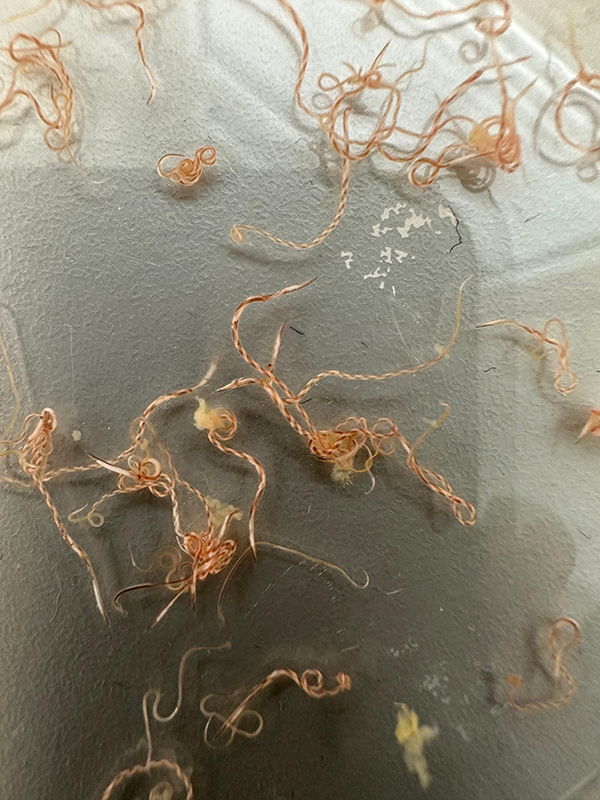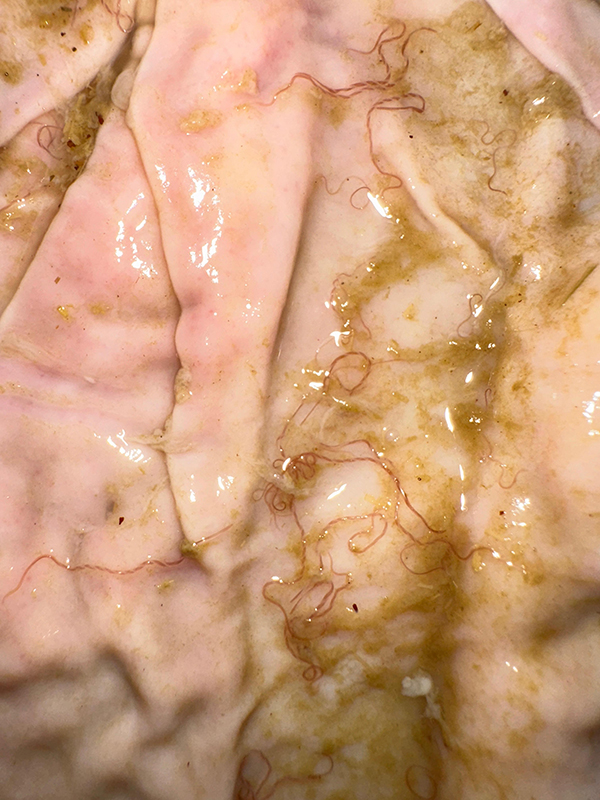New research aids development of vaccine to protect livestock from dangerous parasite
Researchers from the Royal Veterinary College (RVC), in collaboration with the University of Veterinary Medicine and the University of Natural Resources and Life Sciences, both in Vienna, have developed the first laboratory-made vaccine to protect livestock against the Barber’s Pole worm – a highly damaging gastrointestinal parasite most commonly found in sheep and goats.

Also occasionally found in other ruminants, the Barber’s Pole worm attaches to the host animal’s stomach and feeds on blood, causing severe anaemia, swelling and, in the worst cases, death. It is a major cause of disease and economic loss for farmers worldwide, particularly in warmer climates. Treatment of the parasite and disease control are becoming increasingly difficult to manage due to the parasite developing resistance to many of the drugs traditionally used against it.
Until now, the only available vaccines have been made by harvesting worms from the stomachs of slaughtered sheep – a time-consuming and ethically challenging process.
As part of the first study, the research team first developed a new vaccine technique by using insect cells that can generate the protective proteins normally found in the worm to act as antigens and support the animal host’s immune response.
The second study focused on testing the efficacy of the vaccine in animals. The findings of this study revealed that when given to sheep, the vaccine trains their immune system to recognise the parasite and produce protective antibodies. The research provided promising data showing that the vaccine not only limits the ability of parasites to establish in sheep, but also greatly reduces the number of eggs shed by the parasite, thereby decreasing pasture contamination.
This new method means vaccines could one day be produced without relying on slaughtered animals, making production faster, more reliable and more humane, as well as supporting global efforts to control livestock parasites. It will also enable less reliance on chemical wormers, which are becoming less effective due to the growing drug resistance developing amongst the parasites.

Professor Dirk Werling, Professor of Molecular Immunology at the RVC and co-author of the studies, said:
“This research shows that is indeed possible to create vaccines incorporating “foreign” sugars. This is an area my group has been working on for several years, and I am really pleased that we were asked to contribute with our knowledge to this ground-breaking work. “It was absolutely amazing to collaborate with Shi and Katharina, also welcoming their two PhD students, Ms Isabella Adduci and Ms Floriana Sajovitz-Grohmann to our lab – a collaboration which resulted in two high impact factor publications for them. It clearly shows the high the quality of the work, but also how important this area is. I am looking forward to our ongoing collaboration.”
Dr Shi Yan and Dr Katharina Lichtmannsperger, Scientists at the Veterinary University Vienna, and senior authors of the two papers, said:
“There is an increased need of effective anti-parasitic treatments against devastating gastrointestinal worms, such as Haemonchus. Developing vaccines without having to sacrifice animals is not only a far more reliable, but also ethical and reproducible approach. Therefore, this new study provides good news that the creation of recombinant vaccines against economically important parasitic diseases, such as Haemonchus infection, is indeed possible. “Our approach provides a proof-of-concept study but also highlights the potential of glycoengineering to deliver efficacious vaccines against multiple worm parasites in the near future. This achievement was made possible through close collaboration between basic and applied scientists and was funded by the Programme “Top Vet Science” by the Vetmeduni Vienna.”
This research was produced as part of the work by the RVC’s Centre for Vaccinology and Regenerative Medicine (CVRM), which was founded to pioneer the development and translation of vaccines and regenerative medicine to support both animal and human health.
Notes to Editors
For more information about the RVC’s Molecular Immunology Group, visit: https://www.rvc.ac.uk/research/facilities-and-resources/molecular-immunology-group-laboratory
For more information about the RVC’s Centre for Vaccinology and Regenerative Medicine, visit: https://www.rvc.ac.uk/research/facilities-and-resources/centre-for-vaccinology-and-regenerative-medicine
Reference
Paper 1: Adduci I, Sajovitz-Grohmann F, Wortha LN, Dutkiewicz Z, Weidinger H, Joachim A, Wittek T, Werling D, Wilson IBH, Lichtmannsperger K, Yan S. Glycoengineering of nematode antigens using insect cells: a promising approach for producing bioactive vaccine antigens of the barber's pole worm Haemonchus contortus. Glycobiology. 2025 Aug 5;35(9):cwaf044. doi: 10.1093/glycob/cwaf044.
The paper is available here: https://pubmed.ncbi.nlm.nih.gov/40757507/
Paper 2: Sajovitz-Grohmann F, Adduci I, Werling D, Wiedermann S, Wortha LN, Prole B, Zlöbl J, Elster J, Tichy A, Joachim A, Wittek T, Hinney B, Yan S, Lichtmannsperger K. Safety and efficacy of a novel glycoengineered recombinant vaccine candidate against Haemonchus contortus in sheep. npj Vaccines. 2025 Aug 11;10(1):190. doi: 10.1038/s41541-025-01249-z.
The paper is available here: https://www.nature.com/articles/s41541-025-01249-z
For media enquiries, please contact:
- rvc@plmr.co.uk
- Press Line: 0800 368 9520
About the RVC
- The Royal Veterinary College (RVC) is the UK's largest and longest established independent veterinary school and is a Member Institution of the University of London.
- It is one of the few veterinary schools in the world that hold accreditations from the RCVS in the UK (with associated recognition from the AVBC for Australasia, the VCI for Ireland and the SAVC for South Africa), the EAEVE in the EU, and AVMA (probationary) in the USA and Canada.
- The RVC is ranked as the top veterinary school in the world in the QS World University Rankings by subject, 2025.
- The RVC offers undergraduate and postgraduate programmes in veterinary medicine, veterinary nursing and biological sciences.
- The RVC is a research-led institution, with 88% of its research rated as internationally excellent or world class in the Research Excellence Framework 2021.
- The RVC provides animal owners and the veterinary profession with access to expert veterinary care and advice through its teaching hospitals and first opinion practices in London and Hertfordshire.
You may also be interested in:
-
RVC researchers at forefront of new zoonotic funding programme
The RVC has been awarded more than £5 million as part of a multimillion pound research programme to …

